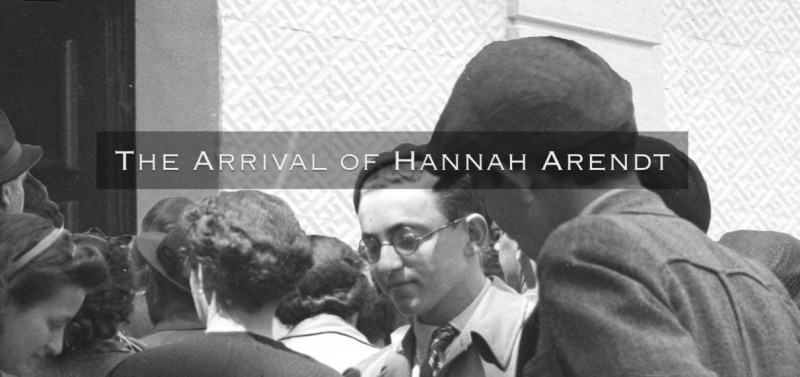
The Arrival of Hannah Arendt
This film describes the arrival of Hannah Arendt - a Jewish, German-American political theorist and publicist - in New York and her reflections on flight and helping people start over.
Josef Wagner
162 West 72nd St
New York
New York, N.Y., 8 Nov
Sehr geehrte Herren!-
Ich habe vor Monaten von Herrn Zuellsdorff einen Fragebogen zugeschickt bekommen, und, da mir sehr viel daran liegt, eine Beihilfe durch die American Guild zu bekommen, habe ich ihn ausgefüllt, und auch Manuskripte hingeschickt.
Mir liegt hauptsächlich daran, einen kleinen Gedichtband zu veröffentlichen. Ich würde Ihnen sehr dankbar sein, wenn Sie mir behilflich sein könnten. Der Gedichtband war kurz vor der Veröffentlichung in Berlin, seinerzeit.
Alle Einwendungen gegen eine Gedichtband sind mir bekannt, aber warum soll der lyrische Dichter nie, nie mehr zu Worte kommen?? Alles Material auch Kritiken über mich, sind in Ihren Händen!
Mit vielen Dank im Voraus,
Ihre sehr eigene,
Lessie Sachs Wagner
Joseph Wagner
162 West 72nd St
New York
New York, N.Y., Nov 8th
Dear Sirs!
I was sent a questionnaire months ago by Mr. Zuellsdorff, and, being very anxious to get a grant from the American Guild, I filled it out, and also sent in manuscripts.
I am mainly interested in publishing a small volume of poetry. I would be very grateful if you could be of assistance. The book of poems was about to be published in Berlin, at the time.
I am aware of all the objections to a book of poems, but why should the lyrical poet never, never be able to speak? All material, including reviews about me, are in your hands!
With many thanks in advance,
Your very own,
Lessie Sachs Wagner
Lessie Sachs-Wagner (1872-1942) born in Breslau was a German artist, poet and author of Jewish origin. She studied at the Breslau Academy of Arts and Crafts and then at the Painting and Drawing School for Women in Munich. While studying in Munich she joined the Communist Party of Germany in 1919. She was imprisoned in Breslau XII penitentiary for six months in 1920. During this time she continued to write poetry.
In 1933 she married pianist Josef Wagner, and a year later their daughter Dorothee was born. The family decided to leave Germany in 1937. They fled to the United States, where they lived in New York. In 1942 Lessie Sachs Wagner died of cancer. After her death, Josef Wagner produced a volume of her poems with a preface by Heinrich Mann, called “Tag- und Nachtgedichten”.
The American Guild for German Cultural Freedom was an organization that helped German artists, writers and intellectuals in exile whose ability to work was affected by the facist government in Germany. The goal of the organization was to help keep German culture alive outside of Germany, as it was unable to survive and prosper within its borders. The American Guild for German Cultural Freedom helped these people through financial aid. The refugee experience of the German exiles varied for each individual. One of the main struggles of refugeedom is the adaptation to a completely new place and finding a support system. The American Guild for German Cultural Freedom tried to help German exiles with that adaptation, so that they would be able to simultaneously also focus on their work.
Letter from Lessie Sachs Wagner to the American Guild for German Cultural Freedom, November 1939 © Deutsches Exilarchiv 1933–1945 der Deutschen Nationalbibliothek – German Exile Archive 1933-1945 from the German National Library.